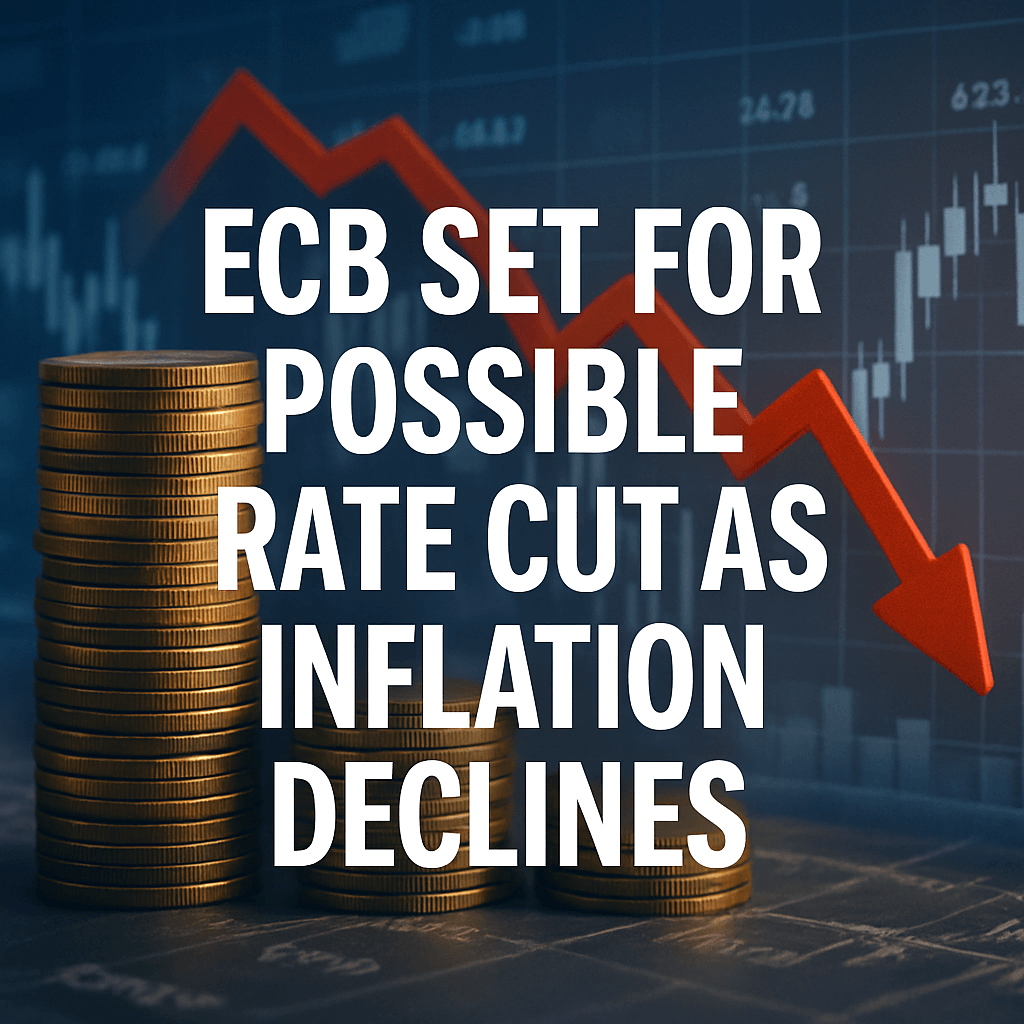ECB Set for Possible Rate Cut as Inflation Declines

The European Central Bank (ECB) is anticipated to announce an interest rate cut at its monetary policy meeting later today. This expectation comes in the wake of a notable decline in inflation indicators, which may influence the ECB’s decision-making process.
Current Market Expectations
At its prior meeting in April, the ECB reduced its benchmark interest rates by 25 basis points to a deposit facility rate of 2.25%. Following this adjustment, the financial markets are now pricing in another rate decrease, potentially occurring in June. However, there is growing uncertainty regarding further rate cuts beyond this month.
Market analysts at Capital.com highlight that while a cut in June seems likely, there is increasing speculation about a pause in the July meeting as the ECB weighs incoming economic data, growth prospects, and inflation trends.
Inflation Trends and Economic Indicators
The latest economic data suggests a cooling of inflation in the euro area, raising expectations for further monetary easing by the ECB. As of May, annual consumer price growth has slowed to 1.9%, a surprising drop from 2.2% in April. This flash estimate from Eurostat is significant as it marks the first occasion since September 2024 that inflation has dipped below the ECB’s 2% target.
- Annual inflation declined to 1.9%, lower than the anticipated 2.0%.
- Core inflation, which excludes volatile food and energy sectors, fell to 2.4% from 2.7%, below forecasts of 2.5%.
- Core prices recorded a minimal monthly increase of just 0.1%.
This drop in inflation can be attributed to various factors, including rising global trade tensions and a reduction in consumer demand, which in turn is impacting pricing power across different sectors of the economy.
Global Market Reactions
As the ECB prepares to make its announcement, global financial markets exhibit mixed trends. In Asia, shares showed a variety of performances, reflecting investor sentiment influenced by recent economic reports coming from the United States.
- Japan’s Nikkei 225 decreased by 0.2% to close at 37,658.46.
- Australia’s S&P/ASX 200 fell nearly 0.1% to 8,535.10.
- South Korea’s Kospi experienced a 2.1% rise, reflecting optimism following the inauguration of its new president, Lee Jae-myung, who promises to engage diplomatically with North Korea.
- Hong Kong’s Hang Seng was up by 0.9% to 23,856.54, while Shanghai Composite remained flat.
Treasury Yields and Commodity Prices
In the U.S. bond market, Treasury yields dropped sharply following the release of weaker-than-expected economic data, which has also affected investor sentiment. The S&P 500 closed virtually unchanged at 5,970.81, yet it still remains approximately 2.8% down from its all-time high. Conversely, crude oil prices displayed slight fluctuations.
- Benchmark U.S. crude prices fell by 8 cents to $62.77 a barrel.
- Brent crude, the international benchmark, increased by a cent to $64.87 a barrel.
The U.S. dollar experienced some strengthening against the Japanese yen, trading at 142.87 yen, up from 142.78 yen. Meanwhile, the euro traded slightly lower at $1.1413, down from $1.1418.
Looking Ahead: What to Watch
As markets await the ECB’s announcement, investors will be closely monitoring additional economic indicators that will shape monetary policy discussions. Critical data to look out for includes subsequent inflation reports, employment figures, and insights into the banking sector’s stability amidst evolving economic conditions.
Expert opinions suggest the ECB may adopt a more cautious stance, emphasizing the need for robust data before pursuing further rate cuts. Central bank officials could signal a readiness to maintain accommodative policies to counteract slowing growth while monitoring inflation closely.
In conclusion, the outcome of today’s ECB meeting will hold significant implications for the eurozone economy, influencing not only interest rates but also broader market dynamics across various sectors.